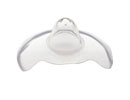Breast and Nipple Care (Part I)

Majority of the new mothers have faced many challenges during breastfeeding in the first few weeks. Some of them may experience sore, cracked, bleeding or painful nipples; the others may have engorgement, plugged ducts or mastitis. It is quite normal for new mothers give up breastfeeding because these problems may cause them stress, pain, discomfort and mood swing.
Nevertheless, breastfeeding should not be painful or discomfort. It is actually a very enjoyable bonding process between you and your baby.
Sore/Painful/Bleeding/Cracked Nipples
Normally, nipples started to be sensitive during the last trimester of your pregnancy. The sensitivity will gradually become stronger and stronger, but it will disappear normally after the first week of delivery. In the first few days of breastfeeding, it is very common to feel sore once baby latches on your nipple. However, it will only last for about one minute maximum and you will slowly feel less and less sore, and then eventually disappears after a few minutes.
On the other hand, if baby latches on in a wrong way, such as she only takes a small portion of the area behind your nipple into her mouth; you probably will feel painful throughout a nursing session and it may cause you nipple crack, blister or bruise. More severely, you may develop a breast infection to some degree.
There are many ways of preventing and treating sore nipples including:
- Use lukewarm water clean your nipple before and after each nursing session, then express some breast milk and place it on the nipples. Let them air dry before put on your nursing bra;
- Apply some nipple cream after each nursing session, Lansinoh and Purelan 100 are the best creams in healing injured nipples;
- Use nipple shields
(everyone is different, some people may not like the feeling of wearing a pair of shields)
- Assess whether your baby’s latching-on position is correct.
Mastitis
Mastitis is generally caused by infection. Breastfeeding mothers who have mastitis typically have a hard, red and swollen area of one breast and likely get a fever (38-39.5 ºC).
Consult your doctor immediately if you notice you may have mastitis. Your doctor may prescribe you some antibiotics for about one to two weeks. Your infections unlikely will pass to your baby; however, she may have severe diarrhea. In this case, change your baby’s diaper frequently in order to prevent diaper rash. Meanwhile, mothers can also take some probiotic supplement because it may help curing baby’s diarrhea.
Here is a good article on “Breastfeeding and Sore Nipples” by Dr. Verity Livingstone.



i love your blog, i have it in my rss reader and always like new things coming up from it.